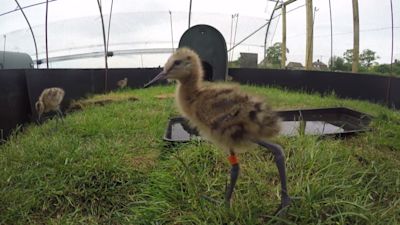Rare wading bird brought back from brink of extinction thanks to Fenland project

Watch a report by Raveena Ghattaura
A rare species of wading bird has been brought back from the brink of extinction thanks to a six year project to increase numbers.
The Black-tailed godwit is current on the 'red list' for birds under conservation concern.
But thanks to a special conservation project introduced in the Ouse Washes at Welney, Norfolk, the black-tailed godwit's future is looking better.
Numbers of Godwits in the UK are now 40% higher thanks to "Project Godwit's" unique approach.
The Wildfowl & Wetlands Trust and the RSPB used a technique called "head starting" which involves collecting eggs from the wild and incubating by hand.
Once hatched, the chicks are hand reared and then released back into the Fens when they are old and strong enough to fly.
It's the first time such a technique has been used on a species of birds in the UK.
Since 2017, more than 200 head-started birds have been released onto the Ouse and Nene Washes and now the final flock has flown the nest.
Hannah Phillips, from the RSPB said: "We estimate the population is around 50 pairs, but were it not for head starting, the population would be a bout 40 per cent lower."
"The fact that we have now got head started birds coming back and breeding in the population themselves has given that populations and the godwits a real boost."
Projects like this at Welney do help enormously say experts, but they warn that new pockets of wetland need to be created to help the species thrive.
Eric Heath from the Wildfowl & Wetlands Trust said: "Head starting has given the species a lifeline. We have given them a chance, we have managed to halt their decline and increased the population fairly substantially."
"But if we don't tackle the wider issues that we face in this landscape - the lack of wetland beyond the nature reserve - there is almost nothing here."
"We really really need to look at wetland creation, wetland restoration, so it is part of the solution but not the whole answer."